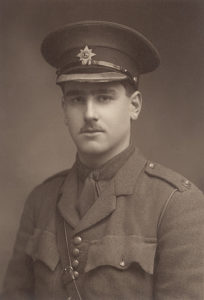
1915 The death of John Kipling
The life expectancy of a junior officer in the British Army on the Western Front in the First World War was rather short — six weeks was the average length of time an officer in a front-line unit could be expected to serve before being killed or wounded. Armed only with a swagger stick or a pistol, they were required to walk ahead of their men across no-man’s-land into the teeth of withering rifle and machine-gun fire. Tens of thousands of young men of the educated class perished in the mud of Flanders. Such a one was John Kipling, only son of the great poet Rudyard Kipling whose hymns to British imperialism had shaped much of the moral landscape of his country.
When the war erupted in 1914 many, including Rudyard Kipling, saw the struggle as one of civilization against barbarism, especially after news of German atrocities in Belgium and the sinking of civilian passenger ships became widespread. Kipling Senior was employed in the development of propaganda to support the war effort and his son was eager to join the armed forces. John tried to join the Royal Navy but his eyesight was too weak to allow him a naval career. He was rejected twice for the same reason by the Army, but his father had connections high up in the chain of command and convinced the generals that his son should be given a commission in a prestige unit, the Irish Guards. After months of training in England, John was sent as an 18-year-old second lieutenant to the front lines just in time for the disastrous Battle of Loos. This was the first British attack to use poisonous chlorine gas, a weapon pioneered by the Germans at Ypres, and the first to employ aircraft as tactical bombers. Nonetheless, the infantry charge on the German trenches failed — on one afternoon, the twelve attacking battalions suffered 8,000 casualties out of 10,000 men in four hours. John Kipling was one of those casualties.
The website “Epitaphs of the Great War” notes that letters of condolence arrived from all over the world. A few of them remain in the Kipling Archive at Sussex. Words of comfort took a different form in those days; I’m not sure we’d appreciate them today, I’m not sure the Kiplings appreciated them then: “I do not imagine that any two parents in England will more cheerfully make the sacrifice or more heroically bear the loss,” (Lord Curzon); “There are so many things worse than death” (Theodore Roosevelt). The novelist Marie Corelli struck the right note when she wrote, “You foresaw what was coming years ago – but few listened to your clarion call of warning”. To her the soldiers were the innocent and their fathers the guilty ones, guilty because they had ignored the warnings about German militarism. This is exactly how Kipling felt, and it is the meaning behind his famous epitaph:
If any question why we died,
Tell them, because our fathers lied.
His father, who was at the Front as a war correspondent, searched desperately for his son’s body but it was not until 1992 that his burial place was located. Kipling’s search and grief are recounted in the play (and later movie) My Boy Jack.